In a heartwarming display of empowerment and mentorship, 17-year-old Joy Ogah stepped into the spotlight on October 21, 2025, becoming Nigeria's Vice President for a day. This symbolic gesture, orchestrated during a meeting at the Presidential Villa in Abuja, highlighted the pressing need for girl-child education and gender inclusivity. As cyber threats and social challenges evolve, stories like Joy's inspire hope and action.
Who Is Joy Ogah? Background of Nigeria's One-Day Vice President
Joy Ogah, a bright and articulate teenager, emerged as a symbol of youthful potential in Nigeria. At just 17 years old, she represents the millions of girls striving for education and equality in a nation where gender disparities persist. While specific details about her personal life, such as her hometown or school, remain limited in public reports, Joy was part of a delegation from PLAN International, a global organization focused on children's rights and gender equality. Her selection for this role underscores her passion for advocacy, likely honed through involvement in youth programs or community initiatives.
PLAN International, active in Nigeria for years, has supported over 11 million children through education, entrepreneurship, and development projects. The organization often spotlights young voices to push for policy changes. Joy's background aligns with the everyday struggles of Nigerian girls: access to schooling, sanitary products, and safe environments. Her story resonates because it humanizes statistics, like the 10.5 million out-of-school children, over 60 percent of whom are girls. In a country where cultural norms and economic barriers often sideline females, Joy's momentary rise to power serves as a reminder of untapped talent. Her eloquence and poise during the event suggest prior training in public speaking, possibly through PLAN's workshops. This background not only prepared her for the day but also positions her as a future leader. As Nigeria grapples with educational inequities, figures like Joy highlight the urgency of investing in the next generation.
The Event Unfolded: Joy Ogah Takes Over as Vice President in Nigeria
The pivotal moment occurred during a courtesy visit by PLAN International to Vice President Kashim Shettima at the Presidential Villa. Led by Helen Mfonobong Idiong, Director of Programme, Quality, and Innovation, the delegation aimed to discuss girl-child education. In a surprising and symbolic move, Shettima invited Joy to occupy his seat, allowing her to address the nation as Vice President for a day. This gesture was more than ceremonial; it amplified youth voices in governance.
The meeting began with Shettima reaffirming President Bola Tinubu's commitment to inclusive education. He highlighted programs like school feeding, which ensure nourished children perform better academically. Then, he stepped aside, handing the floor to Joy. Seated at the Vice President's desk, with the Nigerian flag in the background, she delivered a compelling address. The event drew applause and media attention, symbolizing a bridge between generations. Reports describe the atmosphere as charged with optimism, as Joy's words echoed through the villa. This wasn't just a photo op; it was a call to action, aligning with global efforts like the International Day of the Girl Child. Similar initiatives have occurred elsewhere, such as girls taking over parliamentary seats in other countries, but Joy's moment felt uniquely Nigerian, blending tradition with progressive ideals.
Her Powerful Advocacy: Joy Ogah's Speech on Girl-Child Education in Nigeria
From the Vice President's chair, Joy Ogah didn't hold back. She painted a vivid picture of Nigeria's educational crisis, noting that 10.5 million children are out of school, with girls comprising over 60 percent. She urged strategic interventions from government, partners, and citizens to foster safe, inclusive education. Key demands included enforcing laws to protect girls' rights, providing free sanitary products in schools, and ensuring access to clean water, sanitation, and nutrition.
Joy's words were poignant: "We must invest in education that is safe and inclusive for every child in Nigeria." She added, "When girls are protected, peace becomes possible. I may be the Vice President for a day, but the struggles I represent cannot end in a day. They must continue in our policies, our classrooms, our conversations, and our budgets." Emphasizing dignity over silence, she called for every girl to have a classroom and a choice. Her speech resonated because it addressed root causes like poverty, cultural biases, and insecurity that keep girls from school. In northern Nigeria, where enrollment rates are lowest, such advocacy is crucial. Joy's call echoes global goals, like Sustainable Development Goal 4 for quality education. By highlighting these issues from a position of power, she inspired countless girls to dream big, proving that youth can influence change.
Vice President Shettima's Commitments to Girl Empowerment in Nigeria
Vice President Shettima responded enthusiastically, praising Joy's insights and assuring continued collaboration with PLAN International. He described President Tinubu as a reliable ally for girl-child causes, noting the administration's gender-friendly stance. "We cannot disenfranchise half of our population and expect to grow as a nation," he stated. He cited First Lady Oluremi Tinubu as an example of empowered women leading effectively.
The government has launched initiatives like the Renewed Hope Social Impact Interventions, targeting 10 million women with grants, digital inclusion, and clean energy. Recent policies, including the Student Loans Act and increased education funding, support these efforts. Shettima emphasized school feeding programs, backed by studies showing nourished children excel. This response signals a shift toward inclusivity, with doors open for ongoing dialogue. Critics note implementation challenges, but events like this foster accountability. Joy's day reinforced these commitments, potentially accelerating reforms.
Impact of Joy Ogah's Day on Girl-Child Rights in Nigeria 2025
Joy Ogah's symbolic tenure has ripple effects beyond the villa. It spotlights Nigeria's girl-child crisis, where millions face barriers like early marriage and violence. Advocacy groups push for more investment in mentorship and anti-bias programs. PLAN's work, including removing VAT on sanitary pads following a similar event, shows tangible outcomes.
With economic pressures and insecurity, such stories boost morale. They encourage girls to pursue leadership, challenging stereotypes. Globally, similar "takeover" days in parliaments inspire policy shifts. For Nigeria, this could lead to enhanced budgets for education, aiming for gender parity. Joy's advocacy aligns with national goals, potentially influencing elections and reforms. As netizens debate its symbolism versus substance, the event underscores youth's role in nation-building. It reminds stakeholders that empowering girls builds peaceful, prosperous societies.
Looking Ahead: Future of Girl-Child Empowerment After Joy Ogah's Historic Day in Nigeria
As Joy Ogah's day concludes, the momentum must continue. Stakeholders should prioritize her calls: free pads, safe schools, and inclusive policies. Government partnerships with NGOs like PLAN can amplify impact. Parents, educators, and communities play key roles in supporting girls. Success stories, like increased enrollment from feeding programs, offer blueprints. In 2025 and beyond, measuring progress through reduced out-of-school numbers will be vital. Joy's story isn't just inspirational; it's a blueprint for change. By heeding her voice, Nigeria can unlock its full potential, ensuring every girl thrives.
In summary, Joy Ogah's ascent to Vice President for a day marks a milestone in girl-child advocacy. From her background to the event's echoes, it fuels hope for equality. Stay engaged; the future depends on actions today.
Read More

